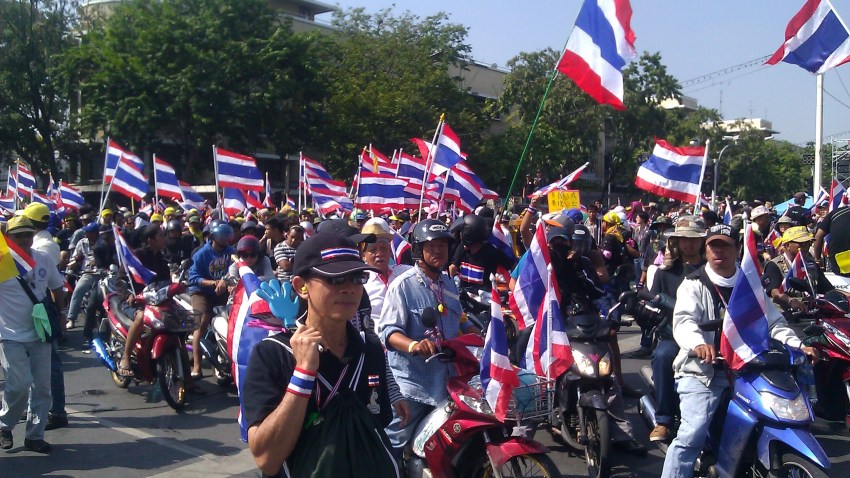Last week, Thailand’s Constitutional Court forced Prime Minister Yingluck Shinawatra to step down. The decision, linked with her removal of the country’s security chief in 2011, has intensified the ongoing showdown that has gripped Thai politics and heightened uncertainty for the future of a key U.S. partnership in Southeast Asia.
Yingluck is only the most recent Thai prime minister connected to influential exiled former Prime Minister Thaksin Shinawatra—she is his sister—to have been removed by the courts since he himself was ousted in a 2006 coup.
The events leave the United States in an awkward position with few options to shape the outcome. U.S.-Thai relations have historically been close, and the U.S. Embassy in Bangkok is a hub for U.S. regional diplomacy. Furthermore, as part of its “pivot” strategy the United States is hoping to build closer relations with the Association for Southeast Asian Nations (ASEAN), as seen during a
recent meeting of defense ministers in Hawaii.
But given Thailand’s importance within ASEAN, crippling political turmoil within the country would likely render ASEAN less able to serve as a security and economic partner for the United States.
There is an “existential struggle for power” in Thailand, says Ernest Bower, senior adviser and Sumitro Chair for Southeast Asia Studies at the Center for Strategic and International Studies (CSIS) in a phone interview. While Yingluck’s ouster has “intensified” Thailand’s pre-existing political tension, the real issue is the “once in a hundred year opportunity” to affect the succession process that will take place when the country’s popular, and ailing, king dies.
“If this were a Shakespearean drama,” he adds, “we’d already be in Act III.”
With the near-term future of the government uncertain, both the pro-government “red shirt” faction and the more conservative “yellow shirt” group are preparing for violent confrontation, leading to concerns that the Thai military could act to restore order.
Elliot Brennan of the Institute for Security and Development Policy in Sweden points out that Gen. Prayuth Chan-ocha, the Thai army chief, issued his “strongest warning yet” today that the army would intervene “in full force” in response to continuing violence. Brennan points to “worrying similarities” with the 2006 coup that ousted Thaksin.
He adds, however, that the current crisis “won’t get to civil war.” The army would step in “well before that.”
Yingluck’s Pheu Thai Party released a statement on Monday entirely blaming the unrest since 2006 on groups “intending to establish [an] authoritarian regime” that have “continuously criticized and defamed” Yingluck for the past six months. The
statement said that the Constitutional Court had “disappointed the public” with its decision, which was “inconsistent with the constitution in all dimensions.”
The statement concluded by encouraging Thai citizens “to stand up for democracy and justice and we promise to stand by you forever.”
The events further complicate the U.S.-Thailand relationship, which a recent Congressional Research Service
report labeled as “stable, although not flourishing.” Despite U.S. enthusiasm for courting Thailand, views on the Thai side are more mixed.
Bower says that while there is “fantastic tactical cooperation” between the two countries, the Thai people have come to regard the United States with suspicion. He recalls that Thais felt the U.S. reaction to the Asian financial crisis in the late 1990s was “very by the book” and lacked compassion.
Thais wonder, says Bower, “what kind of deep and abiding relationship do they really have with the Americans?” Indeed, unpublished CSIS polling of public opinion in several Asian nations indicates that Thailand has the lowest rates of public perception that the United States is a “good and consistent partner.”
Brennan also says there is evidence that the United States “tacitly supported” the 2006 coup, and suggests that many Thais “note that this support, however shallow, was the green light for the coup.” The close ties the U.S. has with the Thai military could also mean that the “U.S. government’s recent warning that the army shouldn’t intervene may act as the strongest incentive yet against a military coup.”
He adds that there is also “immense pressure from businesses and investors in Thailand” to restore stability.
A resolution to the current crisis “needs local ownership,” Brennan says, predicting that an active public role for the United States would be unlikely to improve the situation.
For its part, the Obama administration’s public approach to Thailand’s political strife was summarized in a
statement from Secretary of State John Kerry back in February. “The United States of America does not take sides in Thai politics,” he said. “Ultimately, it is up to the people of Thailand to decide how they will resolve their differences.”

